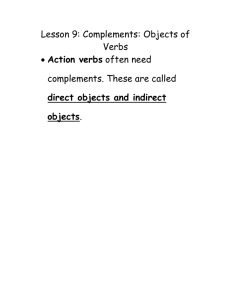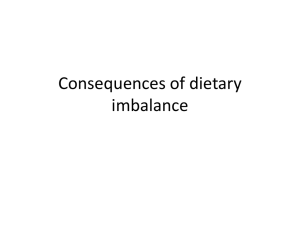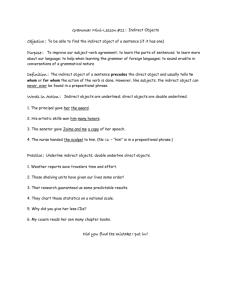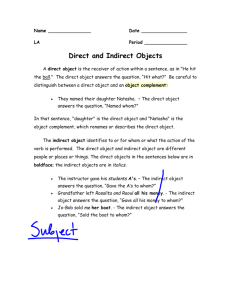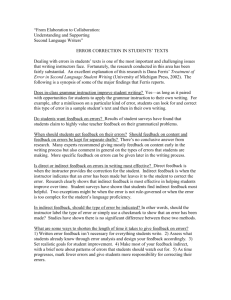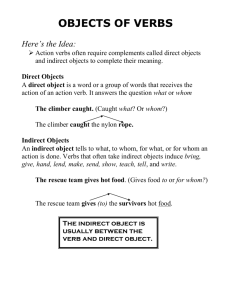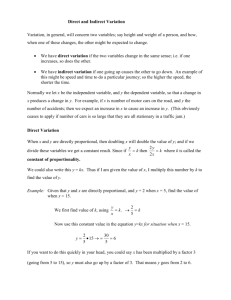Document
advertisement
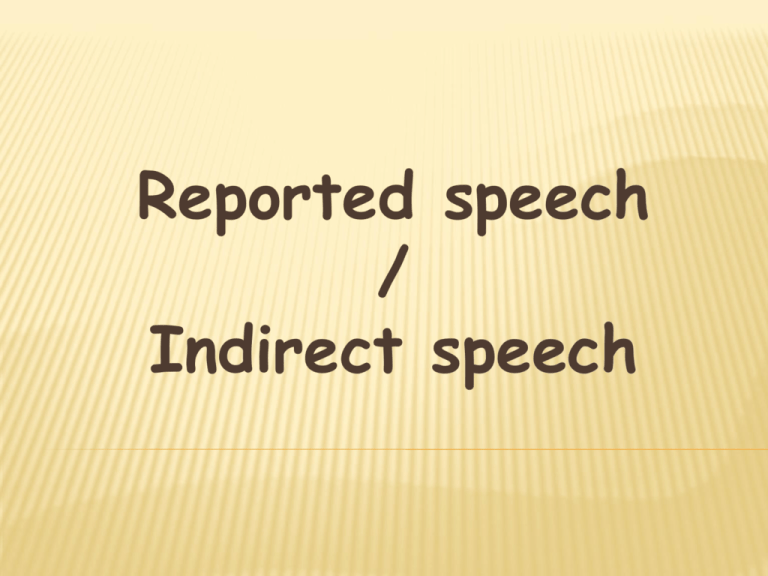
Reported speech / Indirect speech Direct speech Contamos lo que alguien ha dicho sin hacer ningún cambio en sus palabras. Indirect speech Contamos lo que alguien ha dicho pero no repetimos exactamente sus palabras. Las comillas desaparecen. Direct speech El reporting verb está en presente. El reporting verb está en pasado. Indirect speech El tiempo verbal no cambia. El tiempo verbal da un salto al pasado. Direct speech George says: “I want to eat.” Indirect speech George says that he wants to eat. Direct speech “I hate horor films.” says Sergio. Indirect speech Sergio says that he hates horror films. Direct speech Indirect speech Statements Subject + reporting verb + (that) + subject + verb… Direct speech Indirect speech Contamos lo que alguien ha dicho sin hacer ningún cambio en sus palabras. Detrás del “sujeto + said” ponemos la conjunción that. El verbo da un salto atrás hacia el pasado. Direct speech Indirect speech Contamos lo que alguien ha dicho sin hacer ningún cambio en sus palabras. Detrás del “sujeto + tell + C. directo” ponemos la conjunción that. El verbo da un salto atrás hacia el pasado. Direct speech Contamos lo que alguien ha dicho sin hacer ningún cambio en sus palabras. Indirect speech Los pronombres personales cambian. Los adjetivos posesivos cambian. Los pronombres posesivos cambian. Direct speech Contamos lo que alguien ha dicho sin hacer ningún cambio en sus palabras. Indirect speech Los demostrativos cambian. Las expresiones de tiempo cambian. Las expresiones de lugar cambian. Direct speech Indirect speech Present simple. Present continuous. Have. Will. Can. Must. May. Past simple. Past continuous. Had. Would. Could. Had to. Might. Direct speech Indirect speech Past perfect simple. Past perfect simple. Past perfect simple. Past perfect simple. Past perfect continuous. Past simple. Present perfect simple. Past perfect continuous. Direct speech Now. Today. Tomorrow. This. These. Here. I. My. Indirect speech Then. That day. The next / following day. That. Those. There. He / She. His / Her. Direct speech Indirect speech Yesterday. The day before. The day before yesterday. Two days before. The day after tomorrow. Two days later. Next week. The following week / the week after. Last month. The previous month / the month before. Ten years ago. Ten years before. Direct speech George said: “I want to eat.” Indirect speech George said that he wanted to eat. Direct speech “I want to be famous,” said Alex to her friends. Indirect speech Alex said that she wanted to be famous. Direct speech “I want to be famous,” said Alex to her friends. Indirect speech Alex told her friends that she wanted to be famous. Direct speech “I enjoy the beach,” Jenny said. Indirect speech Jenny said that she enjoyed the beach. Direct speech “Brad is studying,”his mum said. Indirect speech Brad’s mum said that he was studying. Direct speech “You can see Big Ben if you go to London,” the tour guide said. Indirect speech The tour guide said that I could see Big Ben if I went to London. Direct speech “You must be 18 to drive,” the police said. Indirect speech The police said that I had to be 18 to drive. Direct speech “I will bring you my CD tomorrow,” Jane said. Indirect speech Jane said that she would bring me her CD the next day. Direct speech “We have been here before,” he said. Indirect speech He said that they had been there before. Direct speech “There was an earthquake last night,” the reporter said. Indirect speech The reporter said that there had been an earthquake the night before. Direct speech “I hate reality TV,” said Jenny. Indirect speech Jenny said that she hated reality TV. Direct speech “I was really proud of my brother when he won a quiz show,” said Clare. Indirect speech Clare said that she had been really proud of her brother when he had won a quiz show. Direct speech Indirect speech “These people deserve better,” stated the MP. The MP stated that those people deserved better. Direct speech “This café is awful;” we can’t eat here!” said Paul. Indirect speech Paul said that that café was awful and they couldn’t eat there. Direct speech “I moved to Oxford six months ago, “ said Scarlett. Indirect speech Scarlett said that she had moved to Oxford six months before. Direct speech “I buy the paper every day,” said Jamie. Indirect speech Jamie said that he bought the paper every day. Direct speech “They are studying,” Kate told me. Indirect speech Kate told me that they were studying. Direct speech “Daniel called me on Saturday,” said Mary. Indirect speech Mary said that Daniel had called her on Saturday. Direct speech “I’ve seen all Almodóvar’s films,” announced Helen. Indirect speech Helen announced that she had seen all Almodóvar’s films. Direct speech “I’ll help you with your homework,” said Ana. Indirect speech Ana said that she would help me with my homework. Direct speech “I can speak Portuguese,” declared Richard. Indirect speech Richard declared that he could speak Portuguese. Direct speech “It may snow today,” warned the weatherman. Indirect speech The weatherman warned that it might snow that day. Direct speech “I must go,” said Betty. Indirect speech Betty said that she had to go. Questions in reported speech Direct speech Indirect speech Questions Wh-questions. Yes / No questions. Subject + reporting verb + wh-word + subject + verb… Subject + reporting verb + whether / if + subject + verb… Direct speech Indirect speech Questions Contamos lo que alguien ha preguntado sin hacer ningún cambio en sus palabras. La interrogativa deja de serlo y se convierte en una oración enunciativa (sin inversión sujeto verbo, sin auxiliar, sin signo de interrogación). Direct speech Indirect speech Questions Contamos lo que alguien ha preguntado sin hacer ningún cambio en sus palabras. El resto de cambios que vimos al principio se mantienen (verbos, pronombres, adjetivos, expresiones de tiempo, expresiones de lugar). Direct speech Indirect speech Questions Las Yes / No questions son las que se contestan con un sí o un no. Al pasarlas a estilo indirecto empleamos el verbo ask + if… Direct speech Indirect speech Questions Las Wh-questions no se pueden contestar con un sí o un no porque empiezan con una partícula interrogativa (What, who, where, when, why,how,…). Al pasarlas a estilo indirecto empleamos el verbo ask + Wh-word… Direct speech Indirect speech Questions “Are they eating now?” I asked. I asked if they were eating then. Direct speech Indirect speech Questions “Is this our new car?” asked Rachel. Rachel asked if that was their new car. Direct speech Indirect speech Questions “What is the name of the new film?” she asked. She asked what the name of the new film was. Direct speech Indirect speech Questions “Where does Ryan live?” Carol asked. Carol asked where Ryan lived. Direct speech Indirect speech Questions “Can we meet now?” Don asked. Don asked if we could meet then. Direct speech Indirect speech Questions “How often do you listen to the Spanish radio?” Tim wanted to know. Tim wanted to know how often we listened to the radio. Direct speech Indirect speech Questions “How is English changing?” she asked. She asked how English was changing. Direct speech Indirect speech Questions “Why do girls want to look like size zero models?” asked the journalist. The journalist asked why girls wanted to look like size zero models. Direct speech Indirect speech Questions “Have you seen the news?” asked Jude. Jude asked me if I had seen the news. Direct speech Indirect speech Questions “How many people will be attending the conference?” asked the organizers. The organizers asked how many people would be attending the conference. Direct speech Indirect speech Questions “Are we obsessed with celebrities?” wondered the magazine editor. The magazine editor wondered whether we were obsessed with celebrities. Orders, requests and suggestions in reported speech Direct speech Indirect speech Affirmative orders and requests Subject + reporting verb + indirect object + to + infinitive… Direct speech Indirect speech Affirmative orders and requests “Can you buy some chocolate when you go to the shop?” asked Susan. Susan asked me to buy some chocolate when I went to the shop. Direct speech Indirect speech Affirmative orders and requests “Read the text,” said the teacher to the students. The teacher told the students to read the text. Direct speech Indirect speech Negative orders and requests Subject + reporting verb + indirect object + not + to + infinitive… Direct speech Indirect speech Negative orders and requests “Don’t move!” the policeman ordered the criminal not to move. The policeman ordered the criminal not to move. Direct speech Indirect speech Suggestions • Subject + suggest + (not) + verb + -ing… • Subject + suggest + (that) + subject + infinitive without to… • Subject + suggest + (that) + should + infinitive without to… Direct speech Indirect speech Suggestions “Let’s not go to France this year,” suggested Jack. Jack suggested not going to France that year. Direct speech Indirect speech Suggestions “How about having sushi tonight?” said Chloe. Chloe suggested that we have sushi that night. Direct speech Indirect speech Suggestions “Why don’t we recycle more?” said Liam. Liam suggested that we should recycle more. Reporting verbs and structures Direct speech Indirect speech Reporting verbs Subject + reporting verb + (not) + to + infinitive… agree / offer / promise / refuse / threaten Indirect speech Reporting verbs He refused to leave the house. Direct speech Indirect speech Reporting verbs Subject + reporting verb +indirect object + (not) + to + infinitive… advise / ask / encourage / invite / order/ persuade / recommend / remind / tell / warn Indirect speech Reporting verbs The weatherman warned us to expect a storm that night. Direct speech Indirect speech Reporting verbs Subject + reporting verb + (not) + verb + -ing… apologize for / deny / recommend / suggest Indirect speech Reporting verbs The paparazzi apologized for harassing the actress. Direct speech Indirect speech Reporting verbs Subject + reporting verb + (that) + subject + verb… add / admit / agree / announce / claim / complain / declare / deny / explain / insist / mention / predict / promise / reply / reveal / say / state / suggest Indirect speech Reporting verbs The man admitted that he had stolen the money. Direct speech Indirect speech Reporting verbs Subject + reporting verb + indirect object + (that) + subject + verb… persuade / remind / tell / warn Indirect speech Reporting verbs Max reminded me that he was going out that night. Direct speech Indirect speech Reporting verbs Subject + reporting verb + if / whether / wh-word + subject + verb… ask / enquire / question / wonder / want to know Indirect speech Reporting verbs The actor wondered whether he would win a prize at the awards ceremony that night. Marga Renedo Gómez
